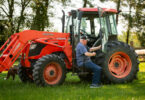“Assalamu alaikum,” or “peace be upon you” will soon be a common greeting for Georgia National Guardsmen who will deploy for Afghanistan this May on a mission to revitalize the war-torn country’s agriculture industry, and UGA agriculture experts helped train them for it.
Earlier this month, 21 members of the 201st Agribusiness Development Team visited the UGA campus in Athens to get hands-on training from specialists with the College of Agricultural and Environmental Sciences. The guardsmen learned about irrigation, crop production, pest management, soils assessment, livestock management and food storage.
“This not a typical training session for us, but when the Georgia National Guard asked for help, we wanted to do all we could,” said Steve Brown, assistant dean for UGA Cooperative Extension. “While our scientists may not be experts in Afghan agriculture, the basics are the same worldwide.”
Essential Skills
Experts taught the guardsmen how to hold and care for chickens, walk through a beehive, prune fruit trees and milk cows. These are essential skills for a country whose agriculture industry is decades behind those of developed countries.
“Milk is a big carrier of diseases like salmonella, tuberculosis, listeria and E. coli,” said Steve Nickerson, UGA dairy scientist. “We are teaching them how to collect the milk in sanitary ways to limit the transmission of disease. They use open systems in Afghanistan to collect milk; if you handle it wrong, you could be killing kids.”
The handpicked guard unit is based at Fort Gordon in Augusta, but members hail from across the state. The team consists of engineers, teachers, pesticide applicators, veterinarians, marketing experts and farmers. It also includes four UGA grads: Gary Church, Warnell School of Forestry and Natural Resources; Carmen Benson, CAES; George McCommon, CAES and College of Veterinary Medicine; and Catherine Tait, Franklin College of Arts and Sciences.
“UGA provides the technical expertise and the experience for this education,” said Lt. Col. Ken Baldowski, media relations officer for the Georgia National Guard. “Afghans are using farming methods that are hundreds of years old in a soil that is depleted of all nutrients. The talent, expertise and knowledge shared with us at UGA will help us to perform this important mission.”
The Mission
“This is a very different mission for us,” Baldowski said. “While Georgia Guardsmen have been deployed to Afghanistan for more than 10 years, now we are arriving with technology and agricultural know-how to share with the Afghan farmers. We hope these methods and insights will help them to produce crops to feed their families and possibly to create a viable agricultural export product.”
More than 80 percent of Afghanistan residents are farmers, but lack the knowledge to produce viable crops and productive yields.
Baldowski hopes Georgia Guardsmen will help Afghan farmers learn to produce crops to feed their families and possibly to export.
“Afghanistan may be a high-tech battlefield,” said Col. Williams, who commands Augusta’s 201st Regional Support Group, “but its agricultural practices are like those of America’s during the 1900s, or in some cases the 1800s. And the income of its people, especially the farmers, is in terrible shape.”
Thirty years of war and prolonged drought have set Afghan farmers way back, said Williams, who will lead the first of three ADT teams to Afghanistan this spring. Georgia is the 13th state to send a specialized ADT team to Afghanistan. The 201st will replace a group from Nevada when they arrive in May.
“Our job will be to help the Afghans change their practices through education, mentorship and ‘easy-to-train, easy-to-sustain’ crop, livestock, water and land-management projects that fit their culture and environment,” Williams said.
Rebuilding
Potatoes, apples, apricots, wheat and eggplant are staples for Afghan farmers. Obstacles like watershed management, lack of refrigeration, limited access to markets and quality seed sources, and transportation hurdles make rebuilding the Afghanistan agriculture industry difficult.
“Our goal is to assist the government in administering these programs by mentoring them so that the government can run them,” Williams said. “Assisting the farmers and villages in creating markets for their food so they can be more self-sufficient and not dependent on foreign imports is a key component to our mission.”
“Assalamu alaikum” is usually uttered with one hand over the heart to show sincerity. Although the National Guard team is being deployed, they all volunteered to be a part of this team. A sincere desire to help the Afghan people improve their farming practices and better their lives – and the future of their country – is at the heart of their mission.
“Even though we are in some dangerous territory, they are good people and that is what is rewarding,” Williams said. “They are no different than us. The way things get done is through relationships. Loyalty and commitment is very important to them, as it is to us.”




